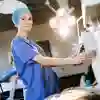




Designed to meet demand for advanced clinical practice studies within health and social care, this programme provides the next step in career progression and academic development.
This inter-professional programme allows you to focus on specialist pathways, whilst maintaining a focus on the core principles of advanced clinical practice including leadership, professionalism, inter-professional communication, and service development and evaluation.
The MSc in Advanced Clinical Practice is a part-time programme, commencing each September.
About this course
Our programme is designed to challenge, empower and support you in becoming a confident and proficient practitioner, enabling a brighter future for you, the patients you care for and society in general.
You’ll learn the theory through evidence-based teaching and get hands-on in clinical simulation using state-of-the-art equipment in our award-winning Allam Medical Building, delivered by our expert lecturers.
Our modules are designed to give you a solid foundation in all aspects of safe and compassionate care – all underpinned by the latest research and evidence – and you’ll learn through a combination of group work, simulated practice, presentations and more.
Plus, we work with our NHS partners to ensure our course is constantly updated to reflect the very latest in healthcare needs and challenges.

MSc Advanced Clinical Practice overview - University of Hull
2 mins
Module options
For a full Masters degree, you'll study 180 credits over the duration of your course. Some programmes offer a Postgraduate Diploma (PGDip) qualification or a Postgraduate Certificate (PGCert) qualification. For a PGDip, you'll study 120 credits, and for a PGCert, you'll study 60 credits.
Filters
Advanced Clinical Assessment and Examination
Develop your competence, knowledge, understanding, confidence and clinical skills in advanced clinical assessment and examination, including complex history taking and physical examination techniques, underpinned with understanding illness and disease progression and resultant symptoms.
core
40 credits
Clinical Reasoning and Leadership
Clinical reasoning and leadership are seen as key skills that healthcare practitioners working at an advanced level need to possess. Without these skills, there is clear evidence that patients come to harm. Learning about clinical reasoning is seen as essential to meet the demands of today.
This module enables practitioners to understand the key theoretical underpinnings of clinical reasoning and leadership. You will benefit from innovative digital teaching methods and clinical simulation in a multi-million pound healthcare campus. This module builds upon history taking and clinical examination skills to provide an immersive simulation lead design.
core
20 credits
Clinical Reasoning and Leadership
Clinical reasoning and leadership are seen as key skills that healthcare practitioners working at an advanced level need to possess. Without these skills, there is clear evidence that patients come to harm. Learning about clinical reasoning is seen as essential to meet the demands of today.
This module enables practitioners to understand the key theoretical underpinnings of clinical reasoning and leadership. You will benefit from innovative digital teaching methods and clinical simulation in a multi-million pound healthcare campus. This module builds upon history taking and clinical examination skills to provide an immersive simulation lead design.
core
20 credits
Non-Medical Prescribing
You will select a pathway as part of this module, choosing from Pharmacist-independent prescribing, Nurse-independent and supplementary prescribing or Physiotherapist, Chiropodist, Podiatrist and Paramedic independent supplementary prescribing.
optional
40 credits
The Deteriorating Child
This module will provide you with the theoretical underpinning knowledge that is required to recognise the deteriorating child. The module is taught by academic staff and current practicing clinicians who are experts in their field. You will learn how to use a systematic approach of assessment to identify and treat the deteriorating child presenting with a variety of chronic and acute conditions.
optional
10 credits
Driving Specialist Developments
This module enables students to examine the context of specialist practice and define their role as educators within clinical settings. Through a practice-based project, students apply leadership and innovation skills to real challenges, developing the ability to evaluate and improve the quality of practice.
Successful completion demonstrates readiness to lead specialist practice development and contribute effectively to education in healthcare environments.
optional
20 credits
Research and Literature Review Methods
Practitioners in all health professional disciplines need to understand the principles of research, to know how knowledge is created and can be evaluated, and to apply the findings of research in the practice setting. You'll identify and critically evaluate research that informs important aspects of your practice.
optional
20 credits
Electrocardiograph (ECG) interpretation
This module will provide you with the theoretical underpinning knowledge that is required to begin to interpret ECGs in clinical practice. The module is taught by academic staff and current practicing clinicians who are experts in their field. You will learn how systematically interpret and relate a variety of ECGs to acute disease pathologies and a variety of long term cardiac conditions.
optional
10 credits
Chest Radiograph (X-Ray) Interpretation
This module will provide you with the theoretical underpinning knowledge that is required to begin to interpret chest radiographs in clinical practice. The module is taught by academic staff and current practicing clinicians who are experts in their field. You will learn how to identify anatomical landmarks, systematically interpret and relate a variety chronic and acute disease pathologies to a variety of high definition chest radiographs.
optional
10 credits
Our academics
Our staff combine teaching and clinical practice with the opportunity to be involved in high-quality research projects.
Their expertise sees them consult with regulatory bodies and government to drive improvement in healthcare, and their research is recognised internationally for its quality.

Zach North
Senior Lecturer in Advanced Clinical Practice
Zach started as a student at Hull in 2006, going on to hold leadership positions within the NHS. Now a programme and academic lead at postgraduate level, he teaches on a range of courses, including Clinical Practice and Advanced Practice.

Josey Coaten
Lecturer and Programme Director of Advanced Clinical Practice
Josey is an experienced Advanced Clinical Practitioner with a background in primary care. She has additional qualifications as a Non-Medical Prescriber and in women’s contraceptive health, with further special interests in palliative care.
Entry Requirements
What do I need?
When it comes to applying for this Postgraduate Taught degree, you'll need an Undergraduate degree (or equivalent). For this course, you'll need a 2:2 from a relevant bachelor's degree.
The programme is designed for graduates who have a studied a subject that is relevant to this course.
If you’re an undergraduate student at Hull, you’re guaranteed a fast-track route to this postgraduate degree, as long as you meet the entry requirements.
In order to ensure our students have a rich learning and student experience, most of our programmes have a mix of domestic and international students. We reserve the right to close applications early to either group if application volumes suggest that this blend cannot be achieved.
Typical offer
2:2 in a relevant subject area
A degree at 2:2 or a diploma with evidence of successful completion of level 7 study within the past 5 years.
You should have an assigned Coordinating Educational Supervisor. This could be a Consultant, Doctor or Advanced Clinical Practitioner, qualified for 2 years or more with supervisory training.
Fees & Funding
How much is it?
Tuition fees for 2027 entry have not been confirmed. Please use 2026-27 information as a guide.
Scholarships
We offer a number of awards, bursaries and scholarships for eligible students. They’re awarded for a variety of reasons including academic achievement and/or to help those on lower incomes.
Scholarships and bursaries are separate to student loans. And the best bit is, you don’t pay a penny back.
International Scholarships and Bursaries
We offer a range of scholarships and bursaries for international students.
Find out more and see if you're eligible for our International Scholarships and Bursaries.
See more Scholarships
We offer a range of scholarships and awards to students at the university to help with their financial load.
To view all of our scholarships and determine whether you're eligible, please visit our Scholarships and Awards page.
Our Facilities


Future prospects
The programme provides a vehicle for continuous professional development for a range of qualified nurses and allied health professions from within the Yorkshire and Humber region.
Commissioned by Health Education Yorkshire and Humber (HEYH), students are employed by a service provider for the duration of the programme. Some hold permanent posts, whilst others are on training contracts.
Take your career to the next level
Like what you’ve seen? Then it’s time to apply.
Make your application online now, and our admissions team will get back to you as soon as possible to make you an offer.
Not ready to apply yet?
We regularly deliver virtual and on-campus events to help you discover your perfect postgraduate course, whether it’s a subject you already love or something completely different. Our events are an opportunity for you to chat to tutors and current students and find out about the career options a postgraduate degree could lead to.
You may also be interested in...
All modules presented on this course page are subject to availability and this list may change at any time.